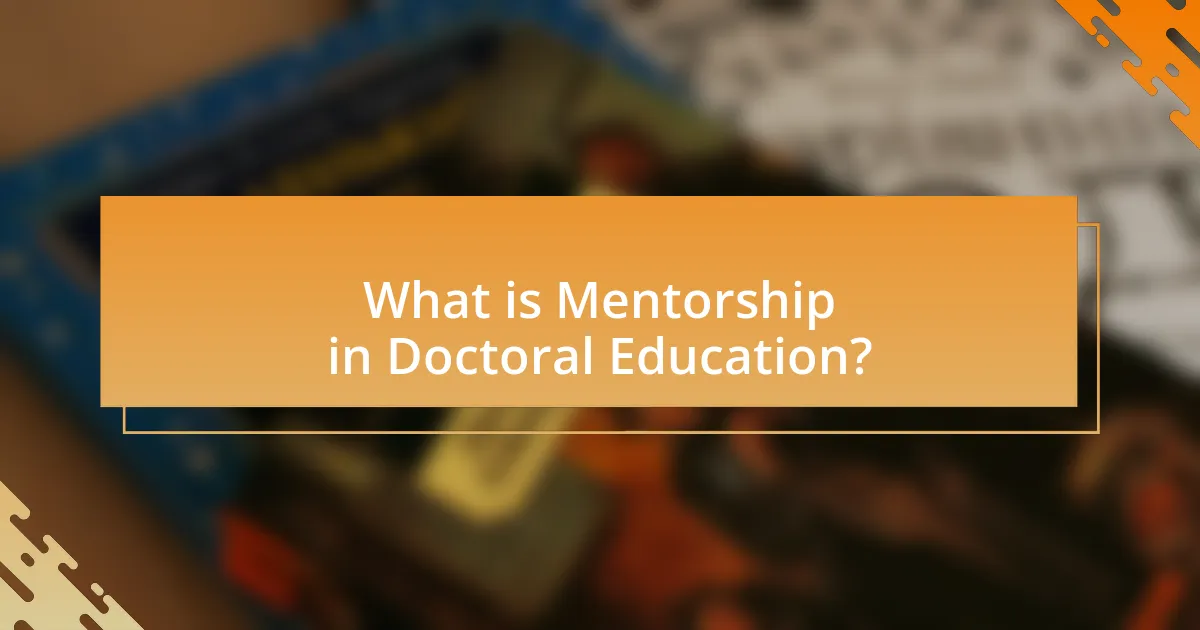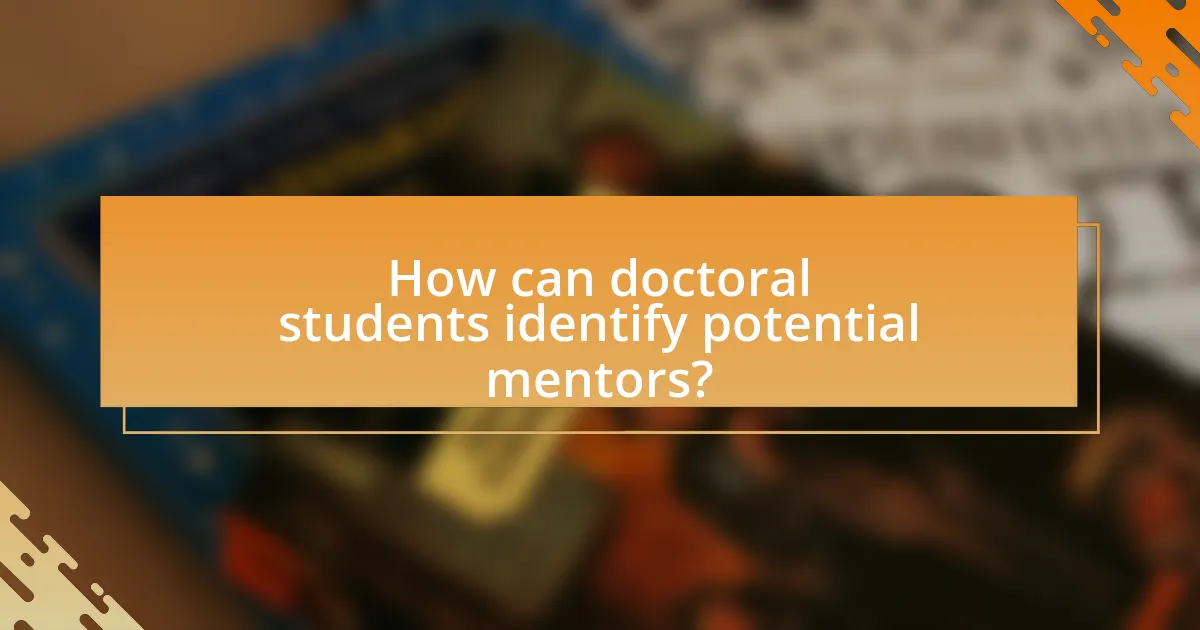Mentorship in doctoral education is a structured relationship where experienced scholars guide doctoral candidates in their academic and professional development. This article explores the significant influence of mentorship on the doctoral journey, highlighting its impact on student success, retention, and overall satisfaction. Key roles of mentors, qualities to look for, and various types of mentorship are discussed, along with strategies for students to identify and engage with potential mentors. Additionally, the article addresses common challenges in mentorship relationships and offers practical tips for enhancing the mentorship experience, emphasizing the importance of effective communication and alignment of expectations.

What is Mentorship in Doctoral Education?
Mentorship in doctoral education is a structured relationship where experienced scholars guide and support doctoral candidates in their academic and professional development. This relationship enhances the mentee’s research skills, provides networking opportunities, and fosters personal growth, which is crucial for navigating the complexities of doctoral studies. Research indicates that effective mentorship can significantly improve doctoral completion rates and overall student satisfaction, as highlighted in studies such as “The Role of Mentoring in Doctoral Education” by Johnson and Lee, published in the Journal of Higher Education.
How does mentorship influence the doctoral journey?
Mentorship significantly influences the doctoral journey by providing guidance, support, and resources essential for academic and professional development. Mentors help doctoral candidates navigate complex research processes, refine their skills, and build professional networks, which are crucial for career advancement. Research indicates that students with effective mentorship report higher levels of satisfaction and success in their programs, as evidenced by a study published in the Journal of Higher Education, which found that 70% of doctoral students with mentors completed their degrees compared to only 50% of those without. This demonstrates that mentorship not only enhances the educational experience but also increases the likelihood of timely degree completion.
What are the key roles of a mentor in doctoral education?
The key roles of a mentor in doctoral education include providing guidance, facilitating professional development, and offering emotional support. Mentors guide doctoral students through the research process, helping them refine their research questions and methodologies. They also facilitate professional development by connecting students with networking opportunities, resources, and relevant academic communities. Additionally, mentors provide emotional support, helping students navigate the challenges and stresses of doctoral studies, which is crucial for maintaining motivation and resilience. Research indicates that effective mentorship positively impacts doctoral students’ academic success and overall well-being, underscoring the importance of these roles in the educational journey.
How does mentorship impact student success and retention?
Mentorship significantly enhances student success and retention by providing guidance, support, and resources that facilitate academic and personal development. Research indicates that students with mentors are more likely to persist in their studies, with a study by Crisp and Cruz (2009) showing that mentored students reported higher levels of satisfaction and engagement in their academic programs. Furthermore, mentorship fosters a sense of belonging and community, which is crucial for retention; a study published in the Journal of College Student Development found that students who felt supported by mentors were 50% more likely to continue their education. These findings underscore the critical role mentorship plays in improving both student outcomes and retention rates in educational settings.
Why is finding the right mentor crucial for doctoral students?
Finding the right mentor is crucial for doctoral students because a suitable mentor significantly influences their academic success and professional development. A mentor provides guidance, support, and resources that help students navigate the complexities of their research and academic environment. Research indicates that effective mentorship can lead to higher completion rates and improved job placement outcomes for doctoral candidates. For instance, a study published in the Journal of Higher Education found that students with strong mentorship relationships reported greater satisfaction with their doctoral experience and were more likely to publish their research. This evidence underscores the importance of selecting a mentor who aligns with the student’s research interests and career goals, as this alignment fosters a productive and supportive mentoring relationship.
What qualities should a mentor possess?
A mentor should possess qualities such as experience, empathy, effective communication, and commitment. Experience allows mentors to provide valuable insights and guidance based on their own academic and professional journeys. Empathy enables mentors to understand the challenges faced by mentees, fostering a supportive environment. Effective communication skills are essential for conveying complex ideas clearly and for active listening, which helps in addressing mentee concerns. Commitment reflects a mentor’s dedication to the mentee’s growth, ensuring consistent support and engagement throughout the mentorship process. These qualities are critical in creating a productive and positive mentoring relationship, particularly in the context of doctoral education.
How can a mentor’s expertise align with a student’s research interests?
A mentor’s expertise can align with a student’s research interests by ensuring that the mentor possesses knowledge and experience in the specific area the student wishes to explore. For instance, if a student is interested in renewable energy technologies, a mentor with a background in environmental science and engineering can provide relevant guidance, resources, and insights. This alignment enhances the student’s learning experience and increases the likelihood of successful research outcomes, as evidenced by studies showing that mentorship significantly impacts doctoral students’ academic performance and career trajectories.
What are the different types of mentorship available in doctoral education?
The different types of mentorship available in doctoral education include traditional mentorship, peer mentorship, group mentorship, and professional mentorship. Traditional mentorship typically involves a one-on-one relationship between a doctoral student and a faculty advisor, focusing on academic guidance and research development. Peer mentorship allows students to support each other, sharing experiences and resources, which can enhance learning and foster collaboration. Group mentorship involves multiple students and mentors, facilitating diverse perspectives and collective problem-solving. Professional mentorship connects students with industry professionals, providing insights into career paths and networking opportunities. Each type of mentorship plays a crucial role in supporting doctoral students throughout their educational journey.
What is the difference between formal and informal mentorship?
Formal mentorship is a structured relationship typically established through an organization or program, while informal mentorship is a more casual, spontaneous relationship that develops organically between individuals. In formal mentorship, roles, expectations, and goals are clearly defined, often involving scheduled meetings and specific objectives, which can enhance accountability and progress tracking. In contrast, informal mentorship lacks these formal structures, allowing for a more flexible and personal interaction that can adapt to the needs and dynamics of the individuals involved. Research indicates that both types of mentorship can be beneficial, but they serve different purposes and may appeal to different preferences in the context of doctoral education.
How do peer mentorship programs function?
Peer mentorship programs function by pairing individuals with similar experiences or backgrounds to provide mutual support, guidance, and knowledge sharing. These programs typically involve structured interactions, where mentors and mentees engage in regular meetings, discussions, and activities aimed at fostering personal and professional development. Research indicates that peer mentorship can enhance academic performance, increase retention rates, and improve overall satisfaction among participants, as evidenced by a study published in the Journal of Higher Education, which found that students involved in peer mentorship reported higher levels of engagement and success in their academic pursuits.

How can doctoral students identify potential mentors?
Doctoral students can identify potential mentors by researching faculty members’ areas of expertise and their publication records. This involves reviewing academic journals, university websites, and attending departmental seminars to understand faculty interests and ongoing research projects. Engaging with current students and alumni can provide insights into faculty mentorship styles and effectiveness. Additionally, utilizing academic networking platforms like ResearchGate or LinkedIn can help students connect with potential mentors who share similar research interests.
What strategies can students use to find suitable mentors?
Students can find suitable mentors by leveraging networking opportunities, utilizing academic resources, and engaging in professional organizations. Networking at conferences, workshops, and seminars allows students to connect with potential mentors in their field. Academic resources, such as faculty directories and departmental events, provide access to professors and researchers who may be open to mentorship. Additionally, joining professional organizations related to their discipline can facilitate introductions to experienced professionals willing to guide students. Research indicates that mentorship significantly enhances academic success and career development, underscoring the importance of these strategies in establishing valuable mentor-mentee relationships.
How can networking enhance the search for a mentor?
Networking enhances the search for a mentor by facilitating connections with experienced professionals who can provide guidance and support. Engaging in networking activities, such as academic conferences, workshops, and professional associations, allows individuals to meet potential mentors in their field. Research indicates that 70% of jobs are found through networking, highlighting its effectiveness in establishing relationships that can lead to mentorship opportunities. Additionally, networking helps individuals gain insights into the experiences and expectations of potential mentors, making it easier to identify those who align with their academic and professional goals.
What role do academic conferences play in mentor identification?
Academic conferences serve as critical platforms for mentor identification by facilitating direct interactions between emerging scholars and established experts in their fields. These events provide opportunities for networking, where doctoral candidates can engage in discussions, seek advice, and explore potential mentorship relationships. Research indicates that 70% of graduate students find mentors through informal interactions at conferences, highlighting the effectiveness of these settings in fostering connections. Additionally, conferences often feature workshops and panels that allow attendees to observe potential mentors’ expertise and teaching styles, further aiding in the identification process.
What questions should students ask potential mentors?
Students should ask potential mentors about their mentoring style, availability, and expectations. Specifically, they can inquire, “How do you typically support your mentees?” to understand the mentor’s approach. Additionally, asking “What is your availability for meetings and feedback?” helps clarify the mentor’s commitment. Students should also consider asking, “What do you expect from your mentees in terms of communication and progress?” to align expectations. These questions are essential as they provide insight into the mentor’s compatibility with the student’s needs and goals, ensuring a productive mentoring relationship.
How can students assess a mentor’s availability and commitment?
Students can assess a mentor’s availability and commitment by directly communicating with the mentor about their expectations and availability. Engaging in an initial conversation allows students to gauge the mentor’s responsiveness and willingness to dedicate time to the mentoring relationship. Additionally, students can observe the mentor’s past interactions with other mentees, noting how frequently the mentor meets with them and the quality of those engagements. Research indicates that effective mentorship often correlates with the mentor’s active involvement, as highlighted in studies showing that mentors who allocate regular time for meetings significantly enhance mentee success rates.
What should students inquire about a mentor’s mentoring style?
Students should inquire about a mentor’s mentoring style by asking how the mentor approaches feedback and communication. Understanding whether a mentor prefers direct, constructive criticism or a more supportive, encouraging approach can significantly impact a student’s development. Additionally, students should ask about the mentor’s availability and preferred methods of interaction, such as in-person meetings, emails, or virtual communication. This information helps students gauge how well the mentor’s style aligns with their own learning preferences and needs.

What are the best practices for establishing a successful mentorship relationship?
The best practices for establishing a successful mentorship relationship include setting clear expectations, maintaining open communication, and fostering mutual respect. Clear expectations help both mentor and mentee understand their roles and goals, which enhances accountability. Open communication allows for honest feedback and discussion of challenges, promoting a supportive environment. Mutual respect ensures that both parties value each other’s time, expertise, and perspectives, which is crucial for a productive relationship. Research indicates that effective mentorship relationships significantly contribute to academic success and professional development, highlighting the importance of these practices in doctoral education.
How can students effectively communicate their needs to their mentor?
Students can effectively communicate their needs to their mentor by being clear, specific, and proactive in their discussions. Clear communication involves articulating specific goals, challenges, and expectations, which helps mentors understand the student’s perspective. For instance, students should prepare for meetings by outlining their needs in advance, such as requesting feedback on a particular project or guidance on career development. Research indicates that effective communication in mentorship relationships leads to better academic outcomes and satisfaction, as highlighted in the study “The Role of Mentoring in Doctoral Education” by Johnson and Lee, which emphasizes the importance of open dialogue for successful mentorship.
What are the expectations that should be set at the beginning of the mentorship?
At the beginning of the mentorship, clear expectations regarding communication, goals, and responsibilities should be established. Effective communication ensures both mentor and mentee understand their preferred methods and frequency of interaction, which is crucial for maintaining a productive relationship. Setting specific, measurable goals helps to align the mentor’s guidance with the mentee’s academic and professional aspirations, fostering accountability. Additionally, defining roles and responsibilities clarifies what each party is expected to contribute, which can enhance the overall effectiveness of the mentorship. Research indicates that structured mentorship relationships, where expectations are clearly outlined, lead to higher satisfaction and better outcomes for both mentors and mentees.
How can feedback be effectively exchanged between mentor and mentee?
Feedback can be effectively exchanged between mentor and mentee through structured communication and active listening. Establishing regular check-ins allows both parties to discuss progress and challenges openly. Utilizing specific feedback techniques, such as the “sandwich method,” where positive feedback is given alongside constructive criticism, enhances receptiveness. Research indicates that effective feedback improves learning outcomes; for instance, a study by Hattie and Timperley (2007) in “Review of Educational Research” highlights that feedback significantly influences student achievement. Therefore, consistent, clear, and constructive dialogue fosters a productive mentoring relationship.
What common challenges might arise in mentorship relationships?
Common challenges in mentorship relationships include miscommunication, differing expectations, and lack of commitment. Miscommunication can lead to misunderstandings about goals and responsibilities, which may hinder the effectiveness of the mentorship. Differing expectations between the mentor and mentee regarding the frequency of meetings, feedback, and support can create frustration and dissatisfaction. Additionally, a lack of commitment from either party can result in an unproductive relationship, where the mentor may not invest sufficient time or the mentee may not actively engage in the process. Research indicates that these challenges can significantly impact the overall success of mentorship in academic settings, particularly in doctoral education, where effective guidance is crucial for student development and completion.
How can students address mismatched expectations with their mentor?
Students can address mismatched expectations with their mentor by initiating an open and honest conversation to clarify their goals and needs. This proactive approach allows students to express their concerns and seek alignment on expectations, which is crucial for a productive mentoring relationship. Research indicates that effective communication is a key factor in successful mentorship, as it fosters understanding and collaboration between students and mentors. By discussing specific areas of misalignment, such as communication frequency or feedback styles, students can work towards a mutually beneficial relationship that enhances their academic and professional development.
What steps can be taken if a mentorship relationship is not working?
If a mentorship relationship is not working, the first step is to communicate openly with the mentor about the specific issues. This direct dialogue can clarify misunderstandings and set expectations. If communication does not resolve the issues, consider seeking feedback from peers or other mentors to gain perspective on the situation. Additionally, reassessing personal goals and aligning them with the mentor’s expertise can help identify mismatches. If the relationship remains unproductive, it may be necessary to explore alternative mentorship options, as research indicates that effective mentorship is crucial for success in doctoral education.
What practical tips can enhance the mentorship experience in doctoral education?
Establishing clear communication is essential to enhance the mentorship experience in doctoral education. Regular meetings should be scheduled to discuss progress, expectations, and challenges, fostering an open dialogue that allows for constructive feedback. Additionally, setting specific goals and milestones can help both the mentor and mentee stay aligned on objectives, ensuring that the mentorship remains focused and productive. Research indicates that structured mentorship programs, which include defined roles and responsibilities, significantly improve the satisfaction and outcomes of doctoral students (Nettles & Millett, 2006). Furthermore, encouraging mentees to take initiative in their learning and seek resources independently can empower them and strengthen the mentor-mentee relationship.
How can students proactively engage with their mentors for maximum benefit?
Students can proactively engage with their mentors by setting clear goals and maintaining regular communication. Establishing specific objectives allows students to direct their discussions and seek targeted advice, which enhances the mentoring relationship. Regular check-ins, whether through scheduled meetings or informal conversations, ensure ongoing dialogue and feedback, fostering a deeper understanding of the mentor’s insights and experiences. Research indicates that consistent interaction between students and mentors significantly improves academic outcomes and professional development, as highlighted in the study “The Role of Mentoring in Doctoral Education” by Johnson and Lee (2019), which found that students who actively engaged with their mentors reported higher satisfaction and success rates in their programs.
What resources are available to support mentorship in doctoral education?
Resources available to support mentorship in doctoral education include mentorship programs, online platforms, and institutional support services. Many universities offer structured mentorship programs that pair doctoral students with faculty mentors, providing guidance and support throughout their academic journey. Online platforms, such as MentorNet and LinkedIn, facilitate connections between students and experienced professionals in their field. Additionally, institutional support services, including workshops and training sessions on effective mentorship practices, enhance the mentorship experience by equipping both mentors and mentees with essential skills. These resources collectively contribute to fostering a supportive environment for doctoral students, ultimately improving their academic success and professional development.



